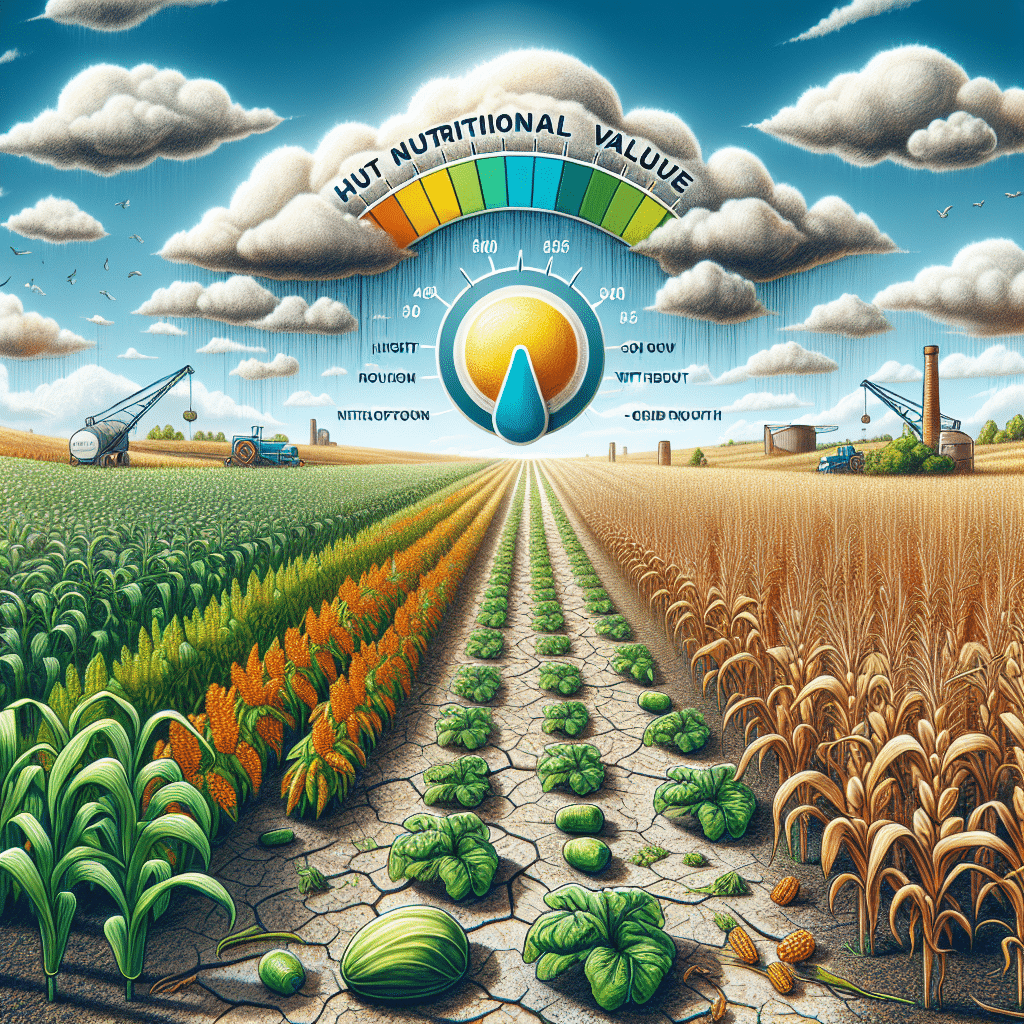Climate Change Can Make Crops Less Nutritious
-
Table of Contents
Climate Change and Its Impact on Crop Nutrition

Climate change is not just a threat to our weather systems and global sea levels; it also poses a significant risk to the nutritional value of the crops we depend on for sustenance. As the planet warms and atmospheric conditions change, the very composition of our food is being altered, with potentially serious implications for human health. This article delves into the ways in which climate change can make crops less nutritious and explores the consequences of this phenomenon.
The Nutritional Decline in Crops
Research has shown that rising levels of carbon dioxide (CO2), a key driver of climate change, can lower the concentrations of essential nutrients in many crop species. This includes reductions in proteins, minerals, and vitamins, which are crucial for a balanced diet. The following points highlight the key findings:
- Increased CO2 levels can lead to a decrease in protein content in staple crops such as rice, wheat, and barley.
- Essential minerals like iron, zinc, and selenium, which are vital for human health, are found in lower concentrations in plants grown under high CO2 conditions.
- Vitamin levels, particularly B vitamins, are also susceptible to decline in a high-CO2 environment.
Case Studies and Evidence
Several studies have provided evidence for the nutritional changes in crops due to climate change. For instance:
- A study published in Nature found that higher CO2 levels led to significant reductions in the protein content of rice, a staple food for over half the world’s population.
- Research by the Harvard T.H. Chan School of Public Health indicated that by the middle of this century, millions of people could face protein deficiencies as a result of CO2-related nutrient declines in crops.
- Another study highlighted that zinc and iron levels in crops like wheat, rice, peas, and soybeans are projected to decrease by 3-17% due to increased CO2 levels.
Understanding the Mechanisms
The mechanisms behind the nutrient decline in crops are complex and multifaceted. They include:
- Carbon Dioxide Fertilization: While CO2 can stimulate plant growth, it also changes the plant’s internal processes, leading to a dilution effect where the faster-growing plant accumulates less of certain nutrients.
- Changes in Soil Chemistry: Climate change affects soil health, altering nutrient availability and uptake by plants.
- Altered Water Usage: Changes in precipitation patterns and increased temperatures can stress plants, affecting their ability to absorb nutrients.
Implications for Global Health
The nutritional decline in crops has far-reaching implications for global health, particularly in regions where people rely heavily on a single crop for their dietary needs. The potential consequences include:
- Increased risk of malnutrition and related diseases due to deficiencies in essential nutrients.
- Greater vulnerability to infectious diseases as a result of weakened immune systems.
- Long-term developmental issues in children who do not receive adequate nutrition.
Addressing the Challenge
To combat the nutritional challenges posed by climate change, several strategies are being explored:
- Breeding and genetically modifying crops to enhance their nutritional profiles and resilience to climate change.
- Improving soil management practices to maintain nutrient availability.
- Diversifying diets to reduce reliance on single crops and ensure a broader intake of nutrients.
Conclusion
Climate change is silently altering the nutritional content of our crops, with potentially severe consequences for human health. As CO2 levels continue to rise, the protein, mineral, and vitamin content of many staple foods is declining. This issue underscores the need for immediate action to mitigate climate change and adapt our agricultural practices to safeguard the nutritional quality of our food supply.
Enhance Your Nutrition with ETprotein’s Products
In light of the challenges posed by climate change to crop nutrition, it’s more important than ever to ensure that we’re getting enough essential nutrients from our diets. ETprotein offers a range of high-quality protein products that can help fill the nutritional gaps created by less nutritious crops. Their organic bulk vegan proteins and L-(+)-Ergothioneine are ideal for those looking to supplement their diet with high-purity, non-GMO, allergen-free protein sources.
Whether you’re a manufacturer looking to fortify your food and beverage products or an individual seeking to enhance your personal nutrition, ETprotein’s offerings provide a reliable solution. With a commitment to quality and customer satisfaction, ETprotein is your go-to source for protein and nutrient supplementation in an ever-changing climate.
About ETprotein:
ETprotein, a reputable protein and L-(+)-Ergothioneine (EGT) Chinese factory manufacturer and supplier, is renowned for producing, stocking, exporting, and delivering the highest quality organic bulk vegan proteins and L-(+)-Ergothioneine. They include Organic rice protein, clear rice protein, pea protein, clear pea protein, watermelon seed protein, pumpkin seed protein, sunflower seed protein, mung bean protein, peanut protein, and L-(+)-Ergothioneine EGT Pharmaceutical grade, L-(+)-Ergothioneine EGT food grade, L-(+)-Ergothioneine EGT cosmetic grade, L-(+)-Ergothioneine EGT reference grade and L-(+)-Ergothioneine EGT standard. Their offerings, characterized by a neutral taste, non-GMO, allergen-free attributes, with L-(+)-Ergothioneine purity over 98%, 99%, cater to a diverse range of industries. They serve nutraceutical, pharmaceutical, cosmeceutical, veterinary, as well as food and beverage finished product distributors, traders, and manufacturers across Europe, USA, Canada, Australia, Thailand, Japan, Korea, Brazil, and Chile, among others.
ETprotein specialization includes exporting and delivering tailor-made protein powder and finished nutritional supplements. Their extensive product range covers sectors like Food and Beverage, Sports Nutrition, Weight Management, Dietary Supplements, Health and Wellness Products, and Infant Formula, ensuring comprehensive solutions to meet all your protein needs.
As a trusted company by leading global food and beverage brands and Fortune 500 companies, ETprotein reinforces China’s reputation in the global arena. For more information or to sample their products, please contact them and email sales(at)ETprotein.com today.












